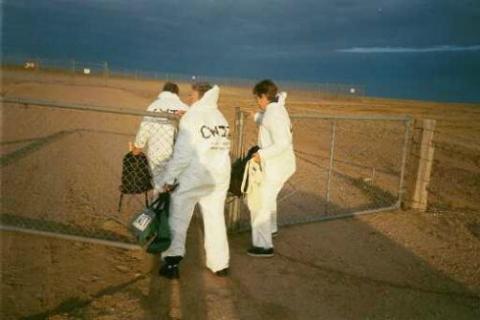
Sr. Carol Gilbert is arrested outside the Pentagon in Washington, D.C., during a protest in the mid-1990s. (Dominican Sisters Archives Collection)
Update: Additional states joined as signatories and/or ratified the Treaty on the Prohibition of Nuclear Weapons Sept. 25 and 26, bringing the totals to 79 signatories and 32 ratifications. Check here for the latest numbers. Sept. 26 is the United Nations' International Day for the Total Elimination of Nuclear Weapons.
It's Sunday, Oct. 6, 2002, and Dominican Sisters Ardeth Platte, Carol Gilbert and Jackie Hudson are walking a field in Weld County, Colorado. Scattered throughout are underground silos that harbor the LGM-30G Minuteman III, an intercontinental ballistic missile with a nuclear warhead that can obliterate most buildings and human beings inside a 4-mile-wide circle. More than 400 Minuteman III missiles lie buried in the farmlands of the Midwest, 49 within this field.

From left, Dominican Srs. Ardeth Platte, Jackie Hudson and Carol Gilbert cut through a gate Oct., 6, 2002, to enter a field harboring nuclear missile silos in Weld County, Colorado. (Courtesy of Plowshares)
The women wear white hazmat suits inscribed with the words, "Disarmament Specialists" and "Citizens' Weapons Inspectors Team," on the back. They snip through two fences, hang a peace banner and pour a cross of blood on the 100-ton lid covering missile silo N-8. "O God, help us to be peacemakers in a hostile world," they pray. Military personnel in Humvees soon barrel across the field and, with weapons drawn, encircle the trio. Raising their arms in the air, the women continue, "O God, help us to be peacemakers in a hostile world."
Fast-forward 15 years to July 2017. The irrepressible Platte, then 81, and Gilbert, 69, are at a workshop in Conference Room One in the basement of the United Nations Headquarters in New York City. A multi-week conference to review the final draft of the Treaty on the Prohibition of Nuclear Weapons is about to conclude. The Dominicans have attended from the beginning as members of the International Campaign to Abolish Nuclear Weapons (ICAN), the driving force behind the ban treaty, as it's popularly known.
All the nuclear states and most European countries have boycotted the conference, giving it an aura of self-consciousness. And bravado. At the workshop, participants brainstorm counterpoints to the naysayers. "This treaty is going to be for the protection of human beings and the planet," offers Platte. Robert Green, a former officer and bombardier in the Royal British Navy who once flew nuclear strike aircraft, provides a more provocative analysis.
The impasse on disarmament "is a nuclear protection racket that is being conducted by a U.S.-led crime syndicate for the benefit of the military-industrial complex," Green says. "This treaty is going to break through that. We have rumbled them. We are going to do this."
"That's right," Gilbert nods vigorously, "That's right."
The ban treaty opened for signatures two years ago, in September 2017. Seventy states have signed, completing the first step of the approval process, and 26 of them have ratified the document. No nuclear powers, including the United States, have signed. The U.S. continues full throttle to upgrade its U.S. nuclear arsenal at a cost approaching $1.2 trillion.

Dominican Srs. Ardeth Platte, left, and Carol Gilbert protest a military base planned for Okinawa, Japan, in front of the White House Feb. 27. (Provided photo)
Nonetheless, the nuns are confident the 50 ratifications required to make the international treaty legally binding will happen. "It's not a matter of 'if,' but 'when,' " Platte says.
Platte and Gilbert are members of the Dominican Sisters of Grand Rapids, Michigan. Like many women religious of their generation, they began their life of ministry as Catholic school teachers, and English, spelling, math and penmanship were among the day's disciplines. For nearly 40 years, though, the two nuns have been educators of a graver subject: nuclear disarmament, a topic they have taught with remarkable persistence and creativity.
Few Americans have had such diverse interface with the U.S. nuclear weapons apparatus as Platte and Gilbert. They have participated in major disarmament initiatives and interacted with those who profit from nuclear weapons, those who guard them, and those who suffer the consequences of U.S. investment in them. Their activism has merited accolades and incarceration. By their own estimate, the women have together spent a total of 15 years in some 40 jails and prisons. Fiercely committed, they remain dispassionate teachers.
"They don't perceive enemies. They see mistaken actions," said Robert Croonquist, a New York photographer of Japanese atomic bomb survivors who has co-facilitated workshops on the ban treaty with the nuns.
For Platte and Gilbert, educators steeped in Catholic teaching on the sacredness of creation, the construction of nuclear weapons represents a fundamental error in human purpose, a horrendous mistake the women have devoted their lives to correcting.
"It's the taproot of all violence, because it is the ultimate destruction of Mother Earth, omnicide, genocide, infanticide, all the 'cides,' " Platte said. "And it is ongoing."

Dominican Srs. Ardeth Platte, Carol Gilbert and Jackie Hudson wait outside a federal courthouse in Denver, Colorado, before their sentencing July 25, 2003, for a Plowshares action in October 2002. In 2011, Hudson endured an excruciating decline from cancer while the three nuns were in prison for another action, and she quickly died upon her release.(Dominican Sisters Archives Collection)
At a federal trial in the spring of 2003, the three Dominicans were found guilty of depredation of government property and sabotage for their action in that Colorado field. That July, the government ordered restitution of $3,080 for damages and sentenced Hudson to 30 months, Gilbert to 33 and Platte to 41, plus three years' probation to all of them, severely restricting their travel.
"I don't fear going to prison," Gilbert told supporters before her sentencing. "I don't fear loss of freedom to move about. I don't even fear death. The fear that fills me is not having lived hard enough, deep enough, sweet enough with whatever gifts God has given me."
Michigan years
Gilbert was born and raised middle class in Traverse City. "God's country," she calls the place famous for its cherries. At 18, she decided to pursue religious life. Back then, Catholic girls had two choices, get married or become a nun, Gilbert said. "I didn't want to have children. We had a lot of young nuns at our school. I thought they had more freedom than married women. I would give this a try; if it didn't work out, I could always leave. What has held me all these years is that I have always seen women religious at the forefront of social justice movements."
Born in the city of Lansing, Platte had a more tumultuous beginning. Her mother left the family when Platte was 18 months old, divorced her husband, and remarried at least twice. Relatives cared for the two children while Platte's father fought in World War II. At age 12, Platte developed a grave infection. Lying on her hospital bed, she heard doctors say they could not save her. "Let me live," she told God, "and I will give my life to you." Platte said she chose the Dominicans "because their love of nature and their emphasis on education touched my soul."
Advertisement
Both women praise their order for wholeheartedly supporting their unique mission of nuclear disarmament.
Platte, Gilbert's former teacher, spent 20 years in formal education, many of them in Saginaw. She was teacher and principal of an inner-city high school and administrated an educational center for school dropouts and expellees. From 1973 to 1985, she served on Saginaw's City Council, the last two years as mayor pro-tem. A woman of boundless energy, Platte also marched for civil rights, supported campaigns for migrant workers, and got arrested protesting the Vietnam War. With a group of lay people, she launched the non-profit Advocacy for Justice in 1976. Gilbert joined the project in 1979. Two years later, the women moved into an old Episcopal rectory and opened Home for Peace and Justice, an organizing hub for many campaigns.
Saginaw honored their civic-minded, social justice nun with several awards. In 1999, Platte was inducted into Michigan Women's Hall of Fame for her achievement in conflict resolution and peace.

Sr. Ardeth Platte stands outside St. Joseph High School in Saginaw, Michigan, where she served as principal in 1968. (Dominican Sisters Archives Collection)
The 1970s and early '80s were the heyday of Catholic social engagement. Inspired by Vatican II's new vision of church, many Catholic religious participated in social justice campaigns and boldly challenged the country's expanding nuclear arsenal. The Dominicans were formed in this milieu, influenced by Michigan's progressive prelates to enter the field of full-time activism.
"We worked on poverty, nuclear power plants, legal funds for incarcerated people. The movement brought together Hispanics, Latinos, African Americans. It was social analysis and organizing," Platte said.
In 1983, the Reagan administration began stationing nuclear weapons in Michigan, ignoring a statewide referendum that supported a nuclear freeze. "We eventually had 600-plus nuclear weapons," Gilbert said. "Can you imagine?"
The deployment angered Platte and refined the Dominican's focus. For the next dozen years, the nuns worked with many others to make their state nuke-free. To highlight the illegality and immorality of the weapons, they held mock nuclear war crimes tribunals and organized statewide Faith and Resistance Retreats. They demonstrated at military bases, occupied the offices of federal lawmakers, and for five years lived beside two Strategic Air Command Bases in Michigan that housed nuclear-armed B-52 bombers.
"We really believed that if two people went to every [nuclear weapon] site and had a daily presence, it would change," Gilbert said.

Dominican Sr. Ardeth Platte is sworn in as member of Saginaw City Council in the 1970s. (Dominican Sisters Archives Collection)
Outliers in their quest for a demilitarized world, the Dominicans became deeply involved in the life of Oscoda, a town located near Wurtsmith Air Force Base. They established a shelter for victims of domestic assault and served on a citizens' council tackling contamination from the base. The Gulf War started shortly after the nuns arrived. "We heard every B-52 go off in the morning," Gilbert said. "During the war, pilots would call us from Iraq and thank us for being there."
"Their compassion and insight were remarkable," Holly Nelson, a former editor with the Oscoda Press, wrote in an email to GSR. "But they were also realists and recognized that Wurtsmith was likely to be decommissioned, costing the community of Oscoda and two Michigan counties their largest employer." When Nelson's articles on base contamination resulted in a boycott of her newspaper, "it was the sisters who made people understand we were only reporting documented facts, minimizing the fallout for me."
Nelson once invited the Dominicans to dinner, much to the chagrin of her police officer husband who had arrested the women multiple times for peace actions at the base.
"The women showed up, toting a potted plastic plant, which they presented as a hostess gift. I gave the appropriate thanks, but am not a plastic person, so knew the plant was headed to the dumpster. We enjoyed our steak dinner and my husband was rolling with laughter as the sisters recounted (with animation) some of their adventures when trespassing on the air base to distribute peace literature. When I was about to get dessert, the sisters pulled out the pot and presented 'dirt cake.'
"It is hard to put into words how powerful these seemingly innocuous women are," Nelson added. "I once tried to nominate them for the Medal of Freedom. My senator never responded."
Plowshares and prison
After the post-Cold War decommissioning of bases rendered Michigan nuke-free, the nuns moved to Jonah House, an intentional lay community located in inner-city Baltimore, Maryland. They immersed themselves in the Plowshares movement, which takes inspiration from the biblical text, "beat swords into plowshares." Using household hammers and baby bottles filled with blood, activists symbolically disarm and mark nuclear weapons sites, then wait for authorities to arrest them. Felony charges and lengthy jail sentences typically follow. Since 1980, there have been just over 100 Plowshares actions in the U.S., Sweden, Ireland, Great Britain, Australia and elsewhere. Platte and Gilbert participated in four, as well other demonstrations.*

Beth Fowler (lower left) plays Sr. Jane Ingalls, a character based on Dominican Sr. Ardeth Platte, in a scene from Season Three of "Orange is the New Black." Platte served time in the Danbury, Connecticut, federal prison with the inmate who wrote the memoir the show is based on. (Courtesy of Netflix)
"I almost avoided [Ardeth] at first, because I didn't want to become associated with a nun," said Carol Soto, Platte's former cellmate in Danbury, a federal prison in Connecticut where the nun was incarcerated after the Dominicans' Plowshares action at the silo in Colorado. Platte is the inspiration for Sr. Jane Ingalls, a character in "Orange Is the New Black," the popular Netflix series based on a memoir by a former Danbury inmate.
An artist and political activist from New York City, Soto said Platte quickly won her over. She described the nun as irresistibly loving and an indefatigable force for good in the prison. "She was a major figure in Danbury. People talked to her about everything." Soto said Platte, then 67, survived on little sleep and could still shoot an impressive 3-pointer in basketball. "She was very athletic."
Publicly, Gilbert and Platte describe prison as their place of solidarity with the poor, who are the ones most affected by the U.S. investment in nuclear weapons at the expense of social good. Prod the nuns, and they will tell you prison stories of hardship and loss. Sickened with shingles, Platte endured a "harrowing" trip from a Maryland jail to Danbury prison because federal marshals lost her pain pills. Gilbert contracted dysentery in a Washington, D.C., jail after male inmates smeared feces on the meal trays to protest the lack of food. The sisters' short stint in the Wayne County Detention Center in Detroit was "a nightmare." Excrement everywhere, Gilbert said. "There were three of us federal prisoners being held in a cell block that had held the mentally ill. I stood on a metal picnic table reading Scripture from Paul in prison, and Ardeth has a cold bucket of water trying to clean."

From left, Dominican Srs. Jean Reimer, Ardeth Platte, Carol Gilbert and Jackie Hudson protest outside Michigan Strategic Air Base in the early 1990s. (Dominican Sisters Archives Collection)
Teaching the treaty
Home for the two nuns these days is a sparsely furnished room at the Dorothy Day Catholic Worker in Washington. Platte sleeps on a twin mattress on the floor. At 83, she can still roll out of bed and raise herself from the floor with remarkable agility, despite arthritis. With the exception of a single crucifix and a border of painted flowers, the walls on her side of the room are bare. Gilbert, now 71, has a few family photos and a bed frame. An icon of St. Dominic adorns the bureau. A 12th-century Spanish canon, Dominic left his cloistered life and traveled southern France preaching against the Albigensian heresy. The icon shows him striding barefoot, a walking stick strung with a pair of sandals perched across his shoulder.
For much of the year, Platte and Gilbert are hopping buses and crossing the country to give presentations on the nuclear weapons ban treaty — New York City and Michigan in September, Wisconsin in October and more gigs scheduled.
They teach in tandem. Platte, occasionally spreading her arms wide in earnest appeal, gives an impassioned overview of the treaty's origin, praising its emphasis on the humanitarian consequences. Countries that sign can "never develop, test, produce, manufacture, acquire, possess, stockpile …," she says, ticking off the prohibitions on her fingers. Gilbert then walks listeners through a half-page worksheet on how to get involved in the nuclear abolition movement. Referencing a line from a T.S. Elliot poem, she urges practicing active hope.
"We are called to be universe disturbers. That is what we are calling you to be."

Sr. Carol Gilbert, left, and Sr. Ardeth Platte teach a workshop on the ban treaty at the Óscar Romero Center in Camden, New Jersey in August 2019. (Claire Schaeffer-Duffy)
At every venue, the nuns make it a point to deliver a copy of the ban treaty to local politicians, a nearby military base or nuclear weapons company; their approach always personal. Gilbert recently gave a copy to Thomas Kennedy, CEO of Raytheon, a major nuclear weapons contractor. They have many anecdotes. "We could write a book," Platte says, "but I don't have time for that."
It's been 36 years since the U.S. Catholic bishops published "The Challenge of Peace," a pastoral on nuclear weapons. The document urged their eventual dismantlement. How to achieve that goal remains the pressing question. Like any good teacher, the Dominicans have committed themselves to modeling the possibilities.
The geography of their ministry surprises them. They expected to live and die in Michigan. God's country. Yet, for Platte and Gilbert, this cross-country travel — like their Michigan campaigns and Plowshare actions — is a variation in pedagogy for a lesson they are compelled to teach.
*This article has been updated to clarify the sisters' activism count.
Editor's note: Dominican Sr. Ardeth Platte died Sept. 30, 2020. Read more here.
[Claire Schaeffer-Duffy, a freelance writer, lives and works at the Sts. Francis and Therese Catholic Worker Community in Worcester, Massachusetts. She and her husband, Scott, co-founded the community in 1987. She has been contributing to National Catholic Reporter since 1999.]






